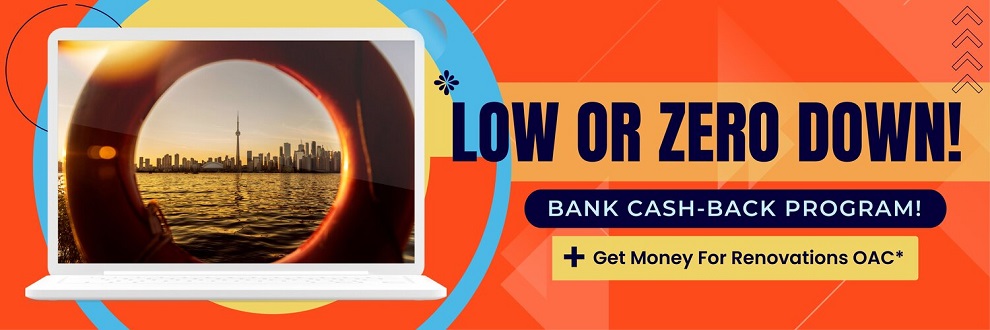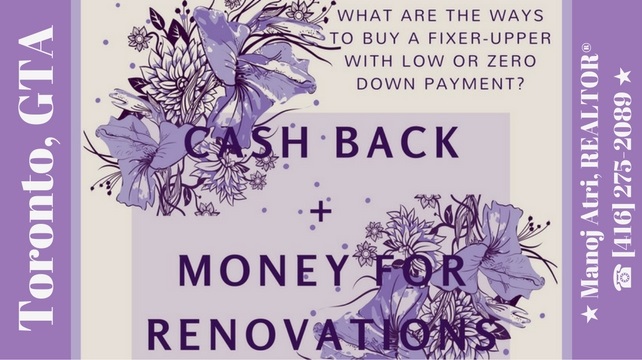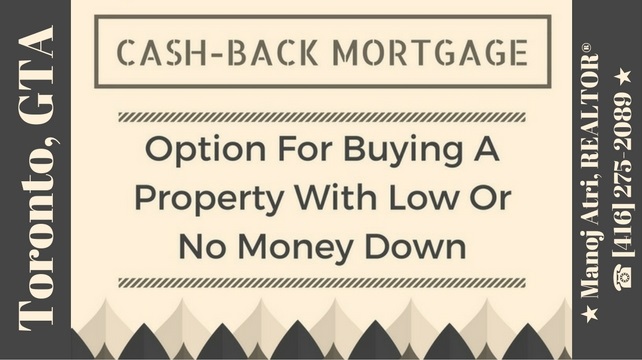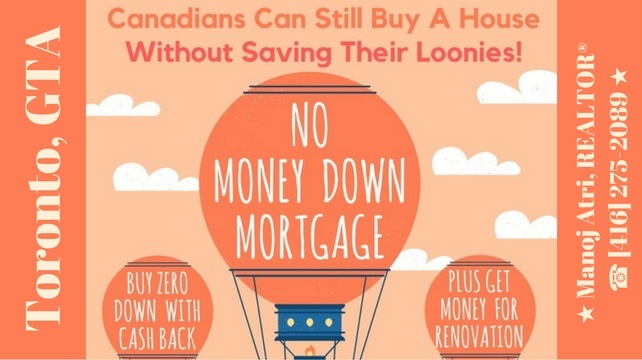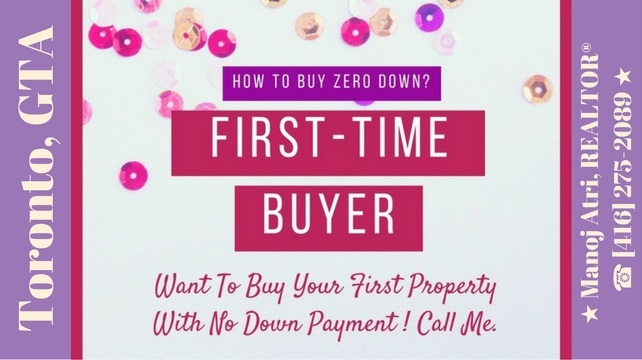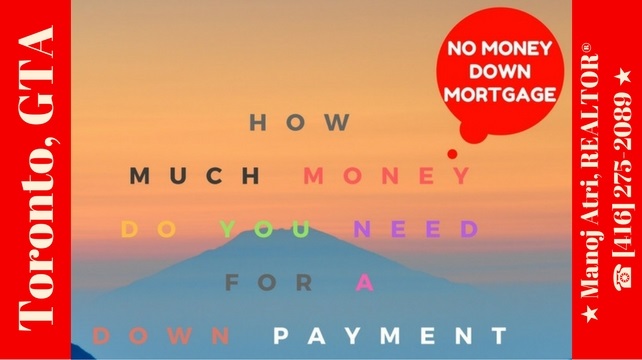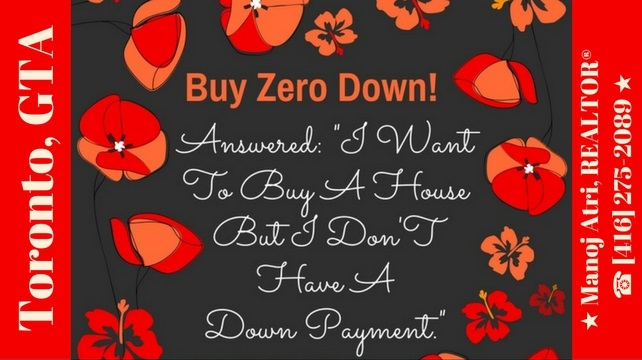💰🏠 How to Buy A Home with Low or Zero Down Payment? 🔑💸 
Buy With Low or Zero Down Payment Video - Kindly update RRSP amount to $60,000
A Home Ownership Bank Program that allows qualified Buyers to Buy a Home with Bank Cash-Back Mortgage!
Can You Get A Mortgage With Low or No Down Payment?
Yes! You can get a Bank Cash-Back mortgage, certain conditions apply [Good Credit Score]. You may have owned a Home before and are presently Renting or maybe you are a First-Time Homebuyer and need a way to break into the Housing Market but held back because you thought you required a $20,000, $30,000 or even more for a Down Payment. Well regardless of your present situation, if you want to get into, or re-enter the housing market without having to make a cash downpayment, then this Bank Cash-Back Program may be just what you're looking for. Why pay your landlord's mortgage when you can be building your own equity.
Dash For Low or Zero Down i.e. Buy with 5% down payment, Take advantage of Bank Cash-Back Program + Get Money for Renovations. On Approved Credit [OAC], Certain Conditions Apply.
Industry insiders have prepared a new special report entitled,
"How to Buy a Home With Low Or Zero Down Payment",
and reveals how this cash-back and innovative program can get you into the housing market immediately and with absolutely low or no downpayment.
Order this report NOW and you can get into the housing market NOW and with ABSOLUTELY LOW or ZERO DOWN PAYMENT.
How does a Bank Cash-Back Mortgage Works?
A cash-back mortgage is a type of mortgage where the lender provides the borrower with a lump sum of cash upon closing the mortgage. The cash-back amount is typically a percentage of the mortgage principal and is predetermined by the lender.
Here's how a cash-back mortgage generally works:
-
Mortgage application: You apply for a mortgage with a lender and go through the regular qualification process, including providing necessary documentation and meeting the lender's criteria.
-
Mortgage terms: The lender offers you a mortgage product that includes a cash-back option. The terms of the cash-back, including the percentage and amount, will be specified in the mortgage agreement.
-
Closing the mortgage: Once you have selected the mortgage and agreed to its terms, you proceed with the mortgage closing process, which involves signing the necessary legal documents and transferring the funds to complete the purchase of the property.
-
Cash-back payment: Upon closing the mortgage, the lender provides you with the agreed-upon cash-back amount. This money is typically provided as a lump sum and can be used for various purposes, such as covering closing costs, making renovations or repairs to the property, or even as a cash reserve for other expenses.
-
Mortgage repayment: It's important to note that the cash-back amount is not free money. It is added to your mortgage principal, and you will be required to repay it over the term of the mortgage. The cash-back amount is typically subject to interest, just like the rest of your mortgage.
Here are a few key considerations regarding cash-back mortgages:
-
Interest rate: Cash-back mortgages often have a slightly higher interest rate compared to regular mortgages. It's important to weigh the benefits of the cash-back amount against the potential long-term cost of the higher interest rate.
-
Mortgage terms: The terms of the cash-back option can vary among lenders. Some may require you to remain with the lender for a specific period, known as the clawback period, or you may be required to repay a portion of the cash-back if you break the mortgage early.
-
Eligibility: Cash-back mortgages may have specific eligibility criteria, such as minimum credit score requirements or income thresholds. Be sure to check with the lender to determine if you meet their criteria for a cash-back mortgage.
Before considering a cash-back mortgage, it's important to carefully evaluate your financial situation, the terms of the mortgage, and your long-term goals. Consulting with a mortgage professional can help you understand the implications of a cash-back mortgage and determine if it aligns with your needs and objectives.
Is Bank Cash-Back Mortgage A Good Deal?
Whether a cash-back mortgage is a good deal or not depends on your specific financial situation and needs. Here are some factors to consider when evaluating a cash-back mortgage:
-
Cash needs: If you require immediate cash for expenses such as closing costs, home renovations, or debt consolidation, a cash-back mortgage can provide a lump sum upfront. It can be a convenient way to access funds without taking on additional debt or tapping into other sources of financing.
-
Interest rate and cost: Cash-back mortgages often come with higher interest rates compared to regular mortgages. It's essential to compare the interest rate and overall cost of the cash-back mortgage with other mortgage options available to you. Consider the long-term impact of the higher interest rate on your mortgage payments and total interest paid over the mortgage term.
-
Flexibility: The cash-back amount can provide flexibility to address immediate financial needs related to homeownership. However, it's important to consider how the cash will be used and whether it aligns with your long-term financial goals. Evaluate if the benefits of the cash-back outweigh the potential costs and limitations associated with the mortgage product.
-
Mortgage term and penalties: Some cash-back mortgages may have specific terms, such as a longer mortgage term or penalties for early mortgage repayment. These terms can impact your flexibility to refinance or pay off the mortgage before the term ends. Be sure to understand the terms and penalties associated with the cash-back mortgage before committing to it.
-
Financial objectives: Consider your long-term financial objectives and whether a cash-back mortgage supports those goals. If the cash-back amount helps you achieve specific financial milestones or accelerates your homeownership plans, it may be a valuable option. However, if it doesn't align with your overall financial strategy, it might not be the best choice.
It's crucial to carefully evaluate the terms, interest rates, costs, and implications of a cash-back mortgage before deciding if it's a good deal for you. Consulting with a mortgage professional can provide personalized advice based on your financial situation and help you make an informed decision.
What's the catch with Bank Cash-Back Mortgage?
Bank cash-back mortgages, like any financial product, have certain terms and conditions that you should be aware of before considering them. Here are some potential considerations or "catches" associated with bank cash-back mortgages:
-
Higher interest rate: Cash-back mortgages typically come with higher interest rates compared to regular mortgages. This means that over the long term, you may end up paying more in interest costs. It's important to calculate the total cost of borrowing, taking into account the higher interest rate, to determine if the benefits of the cash back outweigh the additional interest expenses.
-
Limited flexibility: Cash-back mortgages may come with certain restrictions and limitations. For example, you may be required to keep the mortgage for a specified period, typically the term of the mortgage, in order to retain the cash back. If you decide to refinance or pay off the mortgage before the term ends, you may be required to repay a portion or all of the cash back.
-
Potential repayment obligations: Depending on the terms of the cash-back mortgage, if you sell your property or refinance before the term ends, you may be required to repay a portion of the cash back. This can limit your flexibility if you plan to sell or make changes to your mortgage before the term is up.
-
Limited eligibility: Cash-back mortgages may have specific eligibility criteria. Not all borrowers may qualify for a cash-back mortgage, as lenders typically have requirements related to credit score, income, and other factors. It's important to check with the lender to understand the eligibility criteria for their cash-back mortgage offering.
-
Overall cost analysis: It's crucial to conduct a comprehensive cost analysis to evaluate if the cash back offered by the bank offsets the higher interest rate and any associated costs or restrictions. Consider your specific financial situation, goals, and the total cost of borrowing over the mortgage term.
Before choosing a cash-back mortgage, it's advisable to carefully review and understand all terms and conditions, including interest rates, repayment obligations, and eligibility criteria. Consulting with a mortgage professional can also provide valuable insights and help you assess if a cash-back mortgage aligns with your financial goals and circumstances.
How To Buy A House With Low or No Money Down as a First-Time Home Buyer?
Buying a house with low or no money down as a first-time homebuyer in the Greater Toronto Area (GTA) real estate market is possible through several options. Here are a few strategies specific to Toronto:
-
First-Time Home Buyer Incentive (FTHBI): The FTHBI is a government program available in Canada, including Toronto GTA. It allows eligible first-time homebuyers to finance a portion of their home purchase through a shared equity mortgage with the government. This program can help reduce the amount of money required for a down payment.
-
Home Buyer's Plan (HBP): The HBP is another government program that allows first-time homebuyers to withdraw up to $60,000 from their Registered Retirement Savings Plan (RRSP) tax-free to use as a down payment. This can be a viable option for accessing funds without depleting your savings.
-
Down payment assistance programs: Toronto offers various down payment assistance programs through nonprofit organizations, community groups, and government agencies. These programs provide financial support to eligible first-time homebuyers, helping them overcome the barrier of a large down payment.
-
Negotiate with the seller: In some cases, sellers in Toronto GTA may be willing to assist with the down payment by offering seller financing or flexible payment arrangements. This can help you secure the property with little or no money down and work out a mutually beneficial agreement.
-
Partner with someone: Consider partnering with a family member, friend, or trusted individual to pool resources and buy a home together in Toronto. This can help distribute the down payment and other expenses, making homeownership more affordable.
It's essential to research and understand the specific programs and requirements available in Toronto GTA. Consult with a mortgage professional or a real estate agent experienced in the Toronto GTA market to explore the options that best suit your needs. They can guide you through the process and help you determine the best approach for your situation.
So Are there any specific income requirements for buying a home with low or zero down payment?
When buying a home with a low or zero down payment in the Greater Toronto Area, there are certain income requirements you may need to meet. Here are some factors to consider:
-
Debt-to-income ratio: Lenders typically evaluate your debt-to-income ratio, which is the percentage of your gross monthly income that goes towards debt payments. This includes existing loans, credit card payments, and potential mortgage payments. While the specific requirements may vary among lenders, a lower debt-to-income ratio is generally preferred to ensure you can comfortably manage your mortgage payments.
-
Stable employment and income: Lenders will assess your employment history and income stability. Generally, they prefer applicants who have a steady job with a regular income. They may require documentation such as employment letters, pay stubs, and tax returns to verify your income.
-
Gross Debt Service (GDS) and Total Debt Service (TDS) ratios: These ratios determine the portion of your income that can be allocated towards housing costs (GDS) and total debt obligations (TDS). Lenders typically have specific limits for these ratios, ensuring that your income can cover the monthly mortgage payments along with other debts and expenses.
-
Creditworthiness: Your credit history and credit score play a significant role in obtaining a mortgage with a low or zero down payment. Lenders will review your credit report to assess your payment history, credit utilization, and overall creditworthiness. A good credit score improves your chances of qualifying for a mortgage with favorable terms.
It's important to note that specific income requirements can vary among lenders and depend on factors such as the loan program, property type, and your overall financial profile. Consulting with a mortgage professional or a reputable lender is crucial to determine the income requirements and eligibility criteria for low or zero down payment options in the Toronto GTA market. They can assess your financial situation and guide you through the process of finding the right mortgage solution for your needs.
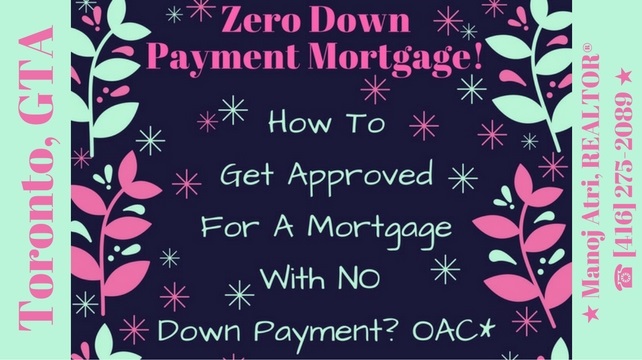
How does high ratio mortgage insurance factor into low or zero down payment homebuying?
High-ratio mortgage insurance is an important factor when it comes to low or zero down payment homebuying. In Canada, if you have a down payment of less than 20% of the purchase price, you are required to obtain mortgage insurance, which protects the lender in case of default.
Here's how high-ratio mortgage insurance works:
-
Insurance Premium: When you have a high-ratio mortgage, you will need to pay a mortgage insurance premium. The premium amount is based on a percentage of the mortgage loan and is added to your mortgage amount. The premium can vary depending on the loan-to-value ratio (LTV), which is the loan amount compared to the property value.
-
Coverage: High-ratio mortgage insurance primarily benefits the lender, as it protects them in case the borrower defaults on the loan. It does not provide any direct financial protection for the borrower.
-
Qualification: Mortgage insurance is typically provided by Canada Mortgage and Housing Corporation (CMHC) or other approved insurers. Lenders often require borrowers to meet specific criteria and guidelines set by these insurers to qualify for a high-ratio mortgage.
-
Cost: The cost of high-ratio mortgage insurance can vary based on factors such as the loan amount, loan-to-value ratio, and amortization period. The insurance premium is usually a one-time payment, but it is added to the mortgage balance, resulting in slightly higher monthly payments.
It's important to note that high-ratio mortgage insurance enables lenders to provide financing options to borrowers with lower down payments. This can be particularly beneficial for first-time homebuyers who may have limited savings for a larger down payment. However, it's essential to consider the added cost of mortgage insurance when evaluating the affordability of a low or zero down payment home purchase.
Working with a mortgage professional or lender can help you understand the specific requirements and costs associated with high-ratio mortgage insurance in the Toronto GTA real estate market. They can guide you through the process and provide you with accurate information tailored to your financial situation.
Should you withdraw from your RRSP to buy a house?
Buying a house? Here’s how to get a big tax refund
How to Use the Home Buyers Plan
Am I Eligible for the Home Buyers' Plan (HBP)?
The Home Buyers’ Plan dilemma
Using RRSPs to Purchase a House? What you need to know
Paying back the RRSP Home Buyers’ Plan
How to borrow money from your RRSP without getting penalized
How Cash Back Mortgages Work and Who Offers Them
Cash-back mortgages: A deal from your Bank that regulators are not keen on
Cash Back Mortgages: The Pros and Cons You Must Know
In today’s high-priced housing market, especially across the Greater Toronto Area, the dream of homeownership often seems out of reach for many first-time buyers due to down payment hurdles. However, recent updates in mortgage policies, new buyer programs, and alternative lending options are opening doors to purchase homes with low or even zero down payment. These news articles—not from agents or realtors’ sites—highlight the most current developments and strategies helping Canadians get into the market with little upfront capital.
🔟 Top 10 News Articles About Buying a Home with Low or Zero Down Payment in Canada
-
🏠 How to Buy a Home with No Down Payment – RE/MAX Canada
This article discusses strategies like using gifted funds, cashback mortgages, or borrowed down payments through lender-approved methods. -
📉 Canada Relaxes Some Mortgage Rules to Tackle Housing Crisis – Reuters
A breakdown of recent rule relaxations, including longer amortizations and raised caps for insured mortgages, helping lower barriers to entry. -
💸 How To Buy A Home With No Money Down In Canada – Forbes Advisor
Forbes covers the feasibility of zero-down purchases through tools like government assistance, second mortgages, and private lending. -
🏡 How to Buy a House in Ontario with No Down Payment – AJP Mortgage
Ontario-specific guidance on rent-to-own options, co-signers, and using RRSPs or alternative lenders to bridge the down payment gap. -
🧾 Can You Buy a House With No Down Payment? – Zolo
This article explains various workarounds to the traditional 5% down, including shared equity mortgages and gifting from family members. -
🔑 The New First-Time Buyer Incentives in Canada in 2025 – Ontario Housing Market
Details new federal incentives, from higher RRSP withdrawal limits to forgivable loans, all designed to help buyers with little cash upfront. -
📊 Canada’s New Mortgage Rules Explained – Gazeley Real Estate Group
Explains how rule changes in 2024 are helping low-equity buyers qualify more easily, including increased flexibility in debt servicing. -
🏘️ 5 Ways To Buy A House With No Down Payment – Centris.ca
Outlines multiple zero-down approaches, including joint ownership, borrowing from family, and specialized lending programs. -
💼 Is It Possible to Buy a House Without a Down Payment in Canada? – Chris Allard
Discusses shared equity loans and regional homebuyer grants that require no or low upfront investment. -
📈 Buying a Home in Canada with No Down Payment – Is It Possible? – The Homess
Covers creative zero-down solutions like guarantor loans, lease-to-own strategies, and using personal credit to fund your first home.
Buying a Home with Bank Cash-Back Mortgage FAQs:
-
Question: What is a Bank Cash-Back Mortgage and how does it work?
Answer: A Bank Cash-Back Mortgage is a type of mortgage where the lender offers a cash incentive to the homebuyer at the time of closing. This cash back is typically a percentage of the mortgage amount and is provided as a lump sum. -
Question: What are the benefits of a Bank Cash-Back Mortgage compared to other types of mortgages?
Answer: The benefits of a Bank Cash-Back Mortgage include the upfront cash injection, which can be used for various purposes such as covering closing costs, making home improvements, or boosting savings. It provides financial flexibility and convenience to the homebuyer. -
Question: How much cash back can I receive with a Bank Cash-Back Mortgage?
Answer: The amount of cash back you can receive with a Bank Cash-Back Mortgage varies depending on the lender and the specific mortgage product. It is typically a percentage of the mortgage amount, such as 1% to 4%. -
Question: Are there any specific eligibility requirements to qualify for a Bank Cash-Back Mortgage?
Answer: Eligibility requirements may vary among lenders, but generally, you need to meet the lender's criteria for mortgage approval, such as a satisfactory credit score, income verification, and a down payment based on the lender's guidelines. -
Question: Can the cash back from a Bank Cash-Back Mortgage be used for any purpose?
Answer: Yes, the cash back from a Bank Cash-Back Mortgage can generally be used for any purpose, including covering closing costs, home improvements, furniture purchases, or as additional savings. -
Question: Does the cash back affect the interest rate or other terms of the mortgage?
Answer: In most cases, the cash back feature of a Bank Cash-Back Mortgage may affect the interest rate or other terms of the mortgage. However, it's important to review the specific details with the lender to ensure you have a clear understanding of the terms. -
Question: Are there any limitations or restrictions on the properties that can be purchased using a Bank Cash-Back Mortgage?
Answer: Generally, there are no specific limitations or restrictions on the properties that can be purchased using a Bank Cash-Back Mortgage. You can typically use it for various types of residential properties, including single-family homes, condominiums, or townhouses. -
Question: How does the cash back from the mortgage get paid out to the homebuyer?
Answer: The cash back from the mortgage is typically provided as a lump sum at the time of closing. It will be disbursed to you through the lawyer or notary handling the transaction. -
Question: Can the cash back be used towards the down payment or closing costs?
Answer: Yes, the cash back from a Bank Cash-Back Mortgage can be used towards the down payment, closing costs, or any other expenses associated with the home purchase. -
Question: Are there any additional fees or conditions associated with a Bank Cash-Back Mortgage?
Answer: It's important to review the specific terms and conditions of the Bank Cash-Back Mortgage offered by the lender. While some lenders may not impose additional fees or conditions, others may have certain requirements or restrictions. Consulting with a mortgage advisor or representative from the bank will provide you with detailed information tailored to your situation.
Please note that these answers are provided as general guidance and may vary based on the specific terms and conditions of the Bank Cash-Back Mortgage offered by the bank. It is recommended to consult with a mortgage advisor or representative from the bank to get accurate and detailed information tailored to your situation.
Act Now: In conclusion, buying a home with a low or zero down payment is no longer just a dream - thanks to innovative bank cash-back programs, it’s an achievable reality for many aspiring homeowners. Understanding how these programs work and leveraging them effectively can open the door to homeownership without the burden of a hefty upfront payment. To unlock the secrets to making this strategy work for you, Sign Up now to receive your FREE Report: Buying With Low Or Zero Down With Bank Cash-Back Program! This comprehensive guide will walk you through the steps, requirements, and insider tips to help you navigate the process with confidence. Don’t let a lack of savings hold you back - download your free report today and take the first step toward owning your dream home!
 Order this FREE Report NOW and you can get into the housing market NOW with ABSOLUTELY LOW or ZERO DOWN PAYMENT!
Order this FREE Report NOW and you can get into the housing market NOW with ABSOLUTELY LOW or ZERO DOWN PAYMENT!
